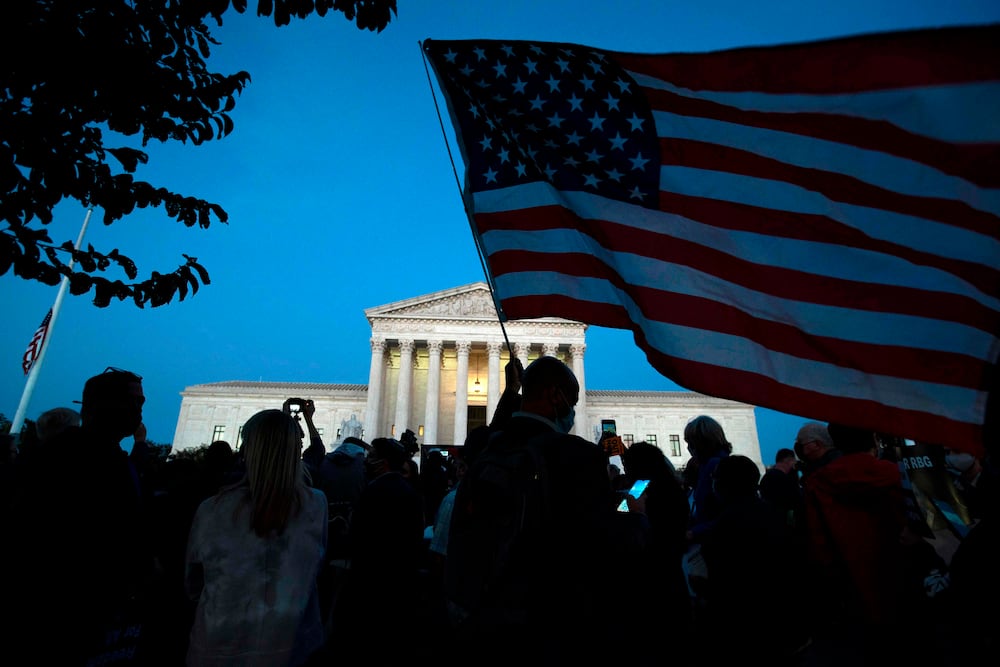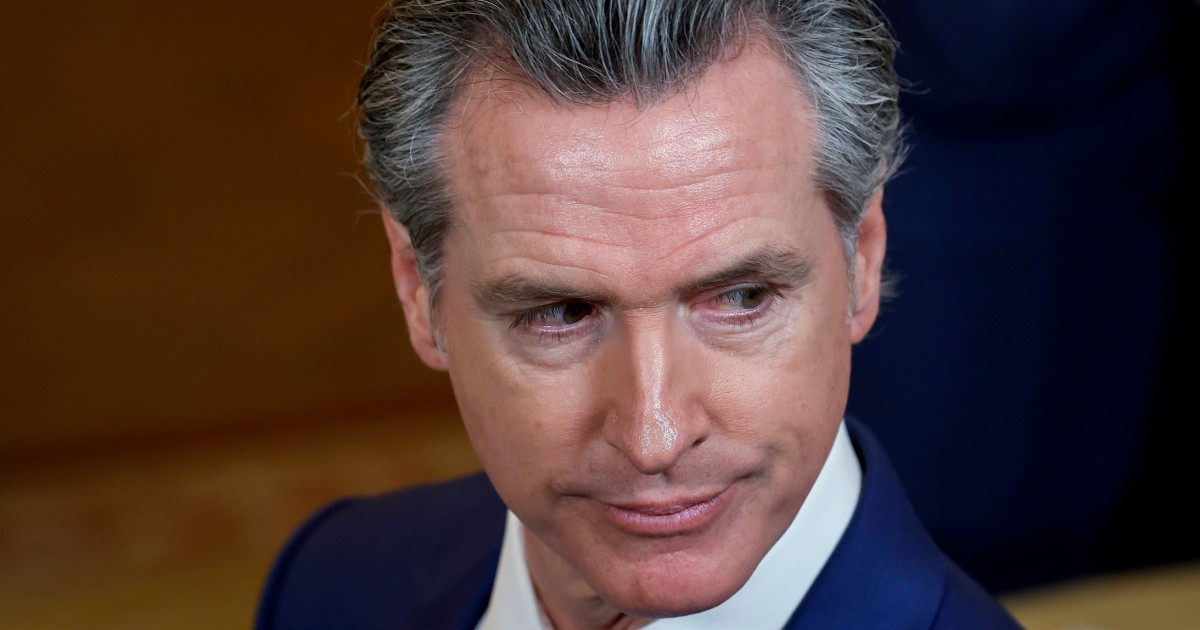There is no duel capable of banishing the political calculation in the United States of 2020. As citizens continue to pay tribute to Judge Ruth Bader Ginsburg, who died Friday at the age of 87, the colossal battle for the Court has already exploded to its full magnitude Supreme call to inflame the 45 days remaining for elections that, before this situation, both parties saw as existential.
Renouncing the composure shown the day before, the president moved the first pawn on Saturday with the announcement that this week he will propose a new name for the Supreme Court and that he will bet on "a woman."
It is up to him to take the first step.
And the president did not wait 24 hours to give it.
On Saturday morning he asked Republicans to start the relief process "without delay."
In the afternoon, at a rally in North Carolina, he announced that the name will be on the table this coming week, cheered by his followers shouting
"Fill that seat!"
(Fill that vacancy!).
The Trump campaign began selling T-shirts with the slogan.
In Washington, meanwhile, hundreds of admirers of Ginsburg, an icon of progressive causes, continued to congregate in front of the Supreme Court.
Flowers, candles, and messages of thanks were piled up at the foot of the imposing marble staircase.
"Rest, we will take care of it from now on," read one of the many posters that promised to continue the judge's fight.
Among the crowd of people who came to pay tribute to Ginsburg, a group of anti-abortionists displayed posters with images of dead fetuses and broke the silence with a megaphone that spat out proclamations.
A sign of how much is at stake in this battle, in which conservatives see an opportunity to deepen and consolidate for decades the right-wing bias of the last judicial dam in the country.
The president of the United States, Donald Trump, this Saturday, in Fayetteville (North Carolina) .tom brenner (reuters) / epv
Trump had already been playing the card of a new appointment of the Supreme Court to encourage the Republican voter in these elections.
On November 9, he presented a list of 20 candidates among whom would be his choice in the event of renewing the presidency.
By announcing that it will be a woman, that list is significantly reduced.
The speculations centered on Amy Coney Barrett, a 48-year-old conservative judge who currently serves on an appeals court.
Barrett has written against abortion as it is currently legalized in the country.
There is also talk of Judge Barbara Lagoa, who is Hispanic and from Miami, which could give Trump, in a new political spin-off, a push in Florida, a state called to be decisive in these elections.
On Saturday, when asked by journalists, the president had words of praise for the two women.
Republicans were called up on Sunday.
It's about securing the support of a simple majority in the Senate, necessary to approve the person Trump nominates.
Republicans have 53 senators to 47 Democrats.
The opposition of four would cause the vote to fail, and in this matter the group is far from behaving like a bloc.
All eyes are on the 23 Republican senators who are playing for re-election on November 3.
Among them is Susan Collins, a senator from Maine, who announced Saturday that she would not vote for Trump's candidate.
They must vote, he said, the candidate proposed by the president who left the polls on November 3.
Collins is seen as a moderate and his seat is in jeopardy.
Also Senators Lisa Murkowski and Chuck Grassley recently said they would object, and the former said Sunday that she has not changed her mind.
President Trump attacked Murkoswki this Sunday morning, retweeting a call for an event with the senator accompanied by a brief message: "No, thank you!"
The two senators with leading roles in this process, and who will also play their seats in November, are Mitch McConnell, leader of the Republican majority, and Lindsay Graham, chairman of the Justice Committee.
The second would be in charge of organizing the appearance of the candidate and has already expressed his willingness to proceed with the nomination, in unseemly contradiction with the position he maintained four years ago of opposing filling a vacancy in the Supreme Court in electoral year.
Just as contradictory (and predictable) has been the reaction of McConnell, who was the author of the unprecedented parliamentary Chicana for which Republicans refused to vote for the judge proposed by Barack Obama in 2016. As then, it is up to McConnell today that whether or not Trump's candidate is voted before the election, or later, or never.
Just an hour after the announcement of Ginsburg's death, the veteran senator cleared up doubts: the chamber, he said, "will vote for President Trump's nominee."
Of course: he did not say when.
This implies that the majority have not yet been insured.
On Friday night, McConnell sent a letter to the senators asking them not to lock themselves in a position they could later "regret."
The Supreme Court is on the ballot.
And the outcome will impact everything from health care to civil rights - affecting generations to come.
Vote
Our future depends on it.
https://t.co/Hy8C4mIL2M
- Joe Biden (@JoeBiden) September 19, 2020
Conservative Christian groups also grease their powerful pressure machines, finally seeing before them the long-awaited possibility of decisively moving the Supreme to the right, on issues as important to them as abortion or same-sex marriage.
The target of their efforts will be precisely the Republican senators, whom they will try to convince that a delay in the Ginsburg relay would demobilize conservative voters who are waiting for a decisive gesture from the party.
The White House had been working on a plan since the spring to replace Judge Ginsburg if the opportunity arose.
Now, the fight for the Supreme Court is seen as a new beginning for an electoral campaign that was not working.
Suddenly, an election that was about Trump's administration turns to the future of the Supreme Court.
Democrats, unarmed to block a simple majority in the Senate, staunchly assist the new Republican offensive.
Chuck Schumer, the Democratic leader, has already warned that they could fight back with institutional reforms if they win control of the chamber in November: for example, expanding the number of Supreme Court justices, which is established by law and not in the Constitution.
The battle also offers Democrats a change in campaign strategy, which some view with optimism.
In recent months, candidate Joe Biden has drawn the election as a plebiscite on the president and his handling of the pandemic.
Now, according to people on his team, if the confirmation hearings in the Senate go ahead, they would like to turn them into an opportunity to talk about the health emergency that is shaking the country and the future of public health.
Just a week after the elections, the Supreme Court has to listen to the arguments about the health reform introduced by Obama, challenged by the Republicans.
This and other classic issues that divide American society are those that, after the death of Judge Ginsburg, suddenly jump to the center of a historic electoral campaign.


/cloudfront-eu-central-1.images.arcpublishing.com/prisa/TSUEZ7K7S5HNDE7GY53532ZZ7A.jpg)


/cloudfront-eu-central-1.images.arcpublishing.com/prisa/OADNJHA33STDSSDCLLQNLNFBWQ.jpg)



/cloudfront-eu-central-1.images.arcpublishing.com/prisa/3F3EHAP7NYDCD7NIOIZLOQJFPI.jpg)





